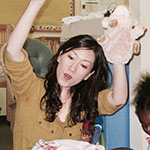
Education
Sophia Kim Cook attended the Premier cycle, interprétation at the Conservatoire de musique de Montréal. She received her B.M. Honors degree at the Schulich School of Music, McGill University. Sophia received her Master’s degree in Music from the Schulich School of Music at McGill University.
Cook also holds Orff Schulwerk Level I, II, and III certifications.
Performance and Teaching Experience
Described as a ‘a steadying presence at the piano’ (Washington Post) and a ‘virtuostic piano backbone’ (DC Arts Beats), Ms. Kim Cook is a sought out pianist, having played for a myriad of soloists and ensembles, including the Washington Concert Opera, the Kennedy Center Opera House Orchestra, members of the National Symphony Orchestra and the Washington National Opera. In fall 2013, Sophia was brought into George Mason University to play for their String Department. Sophia was invited to record a CD with the principal trombonist of the San Francisco Symphony, Tim Higgins, which was released in the spring of 2013. “To talk about the trombone or the pianist individually doesn’t do this recording justice. Their collaboration transcends to another level of beauty and artistry. Absolutely Breathtaking.”
Ms. Kim Cook also plays for students in the National Symphony Orchestra Youth Fellow Program, the George Mason University String Department, and graduate students at Catholic University.
At Levine
Since joining Levine in 2008, Ms. Kim Cook has taught for Levine’s Early Childhood Music Outreach program in JC Nalle Elementary School (SE DC), New Image (SE DC), and THEARC. She is now teaching at Northwest Settlement House (NW DC) and Kids Are Us (SE DC) for children ages 4 months to 4 years.
Teaching Philosophy and Approach:
“I am privileged to work for Levine’s Outreach Program. I have said many times that music education is hard to quantify. In this case, Levine’s presence at the heart of the community has tremendous benefits for the children. We know that music doesn’t just affect body and soul, but also affects our social well-being. Vocal and speech development are improved by singing. Listening skills and concentration are improved with aural training. And, of course, the good old-fashioned goals of sharing and cooperation are reinforced through the sharing of instruments and taking turns in singing games… More importantly, music is a powerful tool for conveying the full spectrum of human emotions in ways that are appropriate for children’s experiences. Children who may not be able to express their happiness, anger, or sadness verbally can find the right outlet and mode in music for what they cannot yet identify or express clearly using the tools of language.”